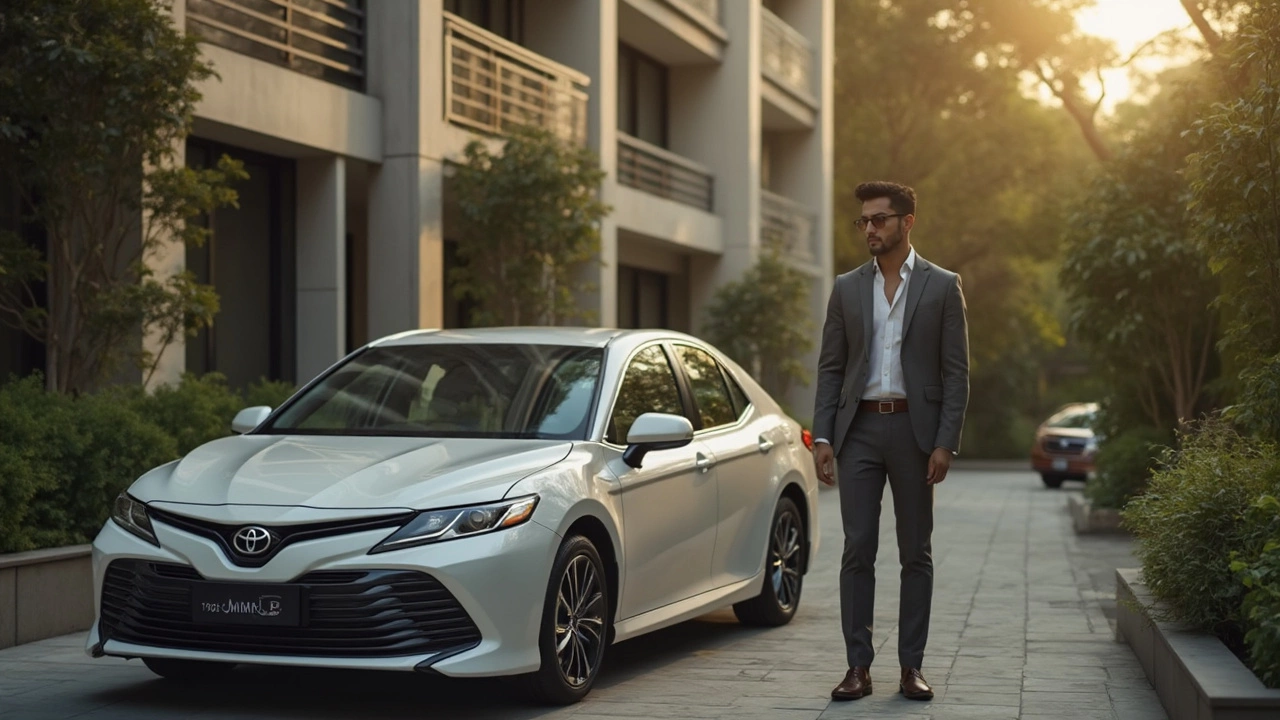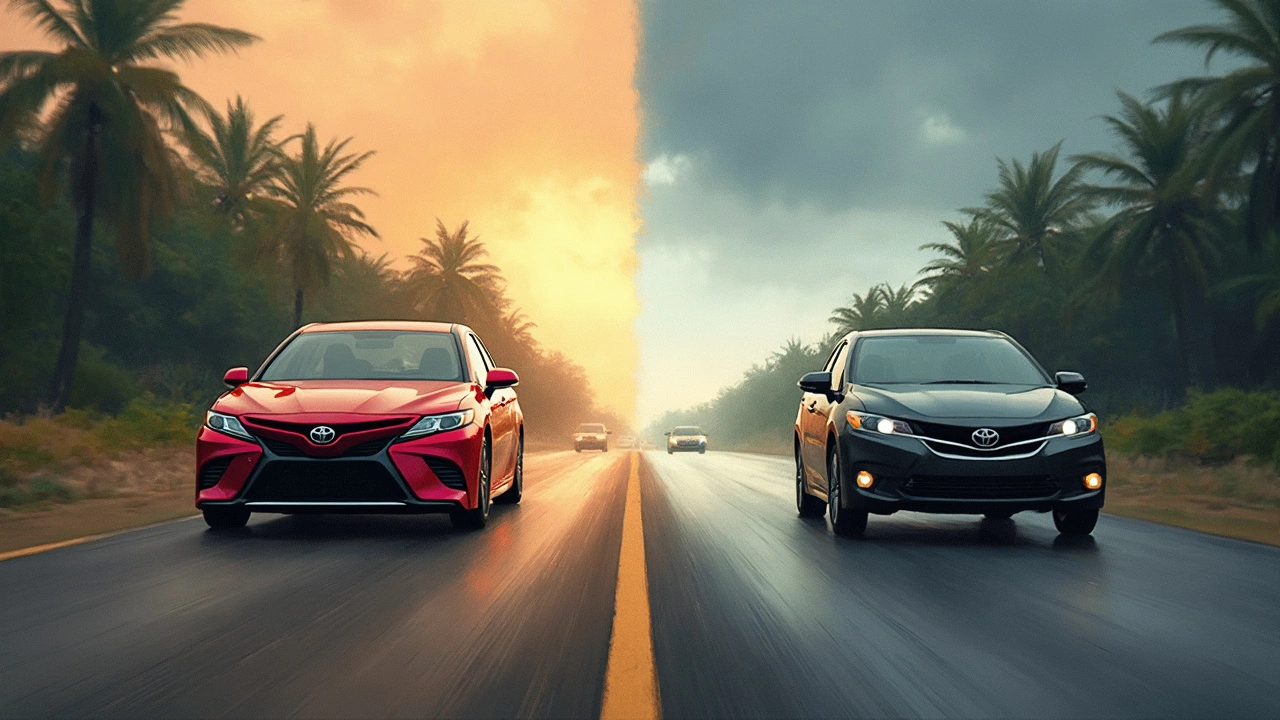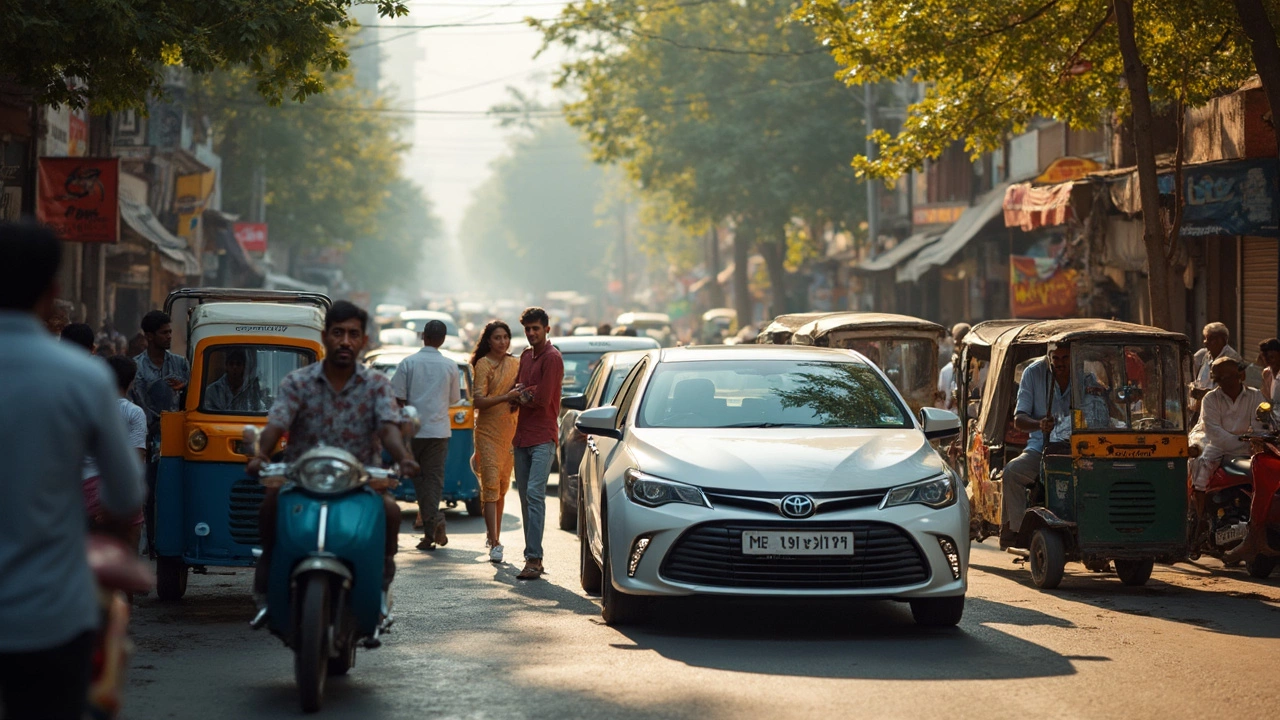Spotting a Toyota Camry rolling down an Indian street isn't rare, but it does make you wonder. Why do Indians pick this sedan, especially when the market is packed with flashier, cheaper, or more homegrown options?
The answer isn’t just about looks or speed. The Camry lives rent-free in the Indian mind because it quietly ticks all the right boxes—reliability that outlasts the average family dog, cabins so comfy they double up as offices, and resale numbers that don’t make you wince four years down the line. Even if your friends tease you for not buying something more “exciting,” ask them how much they’ll sell their ride for after a few years.
This car’s hybrid engine is the kind of tech that turns heads at the petrol pump. With prices shooting up, people are eyeing real-world savings, not just badge value. If you’ve ever been stuck in Delhi traffic, you’ll get why running in electric mode at five kilometers per hour is a major flex. The Camry might seem like a splurge, but buyers see it as smart—not just swanky.
- Camry's Unexpected Popularity in India
- Built to Last: The Reliability Factor
- Hybrid Appeal and Practical Savings
- Status, Comfort, and the Executive Image
- Should You Get a Camry? What to Consider
Camry's Unexpected Popularity in India
If someone made a list of cars that Indians go for when they want a steady upgrade, the Camry India would be right up there. This sedan isn’t the cheapest or the flashiest, so what’s driving the buzz?
The Camry has carved out a weirdly loyal fan base among Indian professionals, business owners, and even some government folks. According to 2024 registration data, Toyota managed to grow the Camry’s market share in the premium sedan segment by over 35%. And when you look at the volume, that’s no small feat in a country obsessed with either tiny hatchbacks or big flashy SUVs.
Why is this surprising? Well, Toyota only sells one Camry variant in India—usually a fully loaded hybrid. No diesel, no stripped-down petrol version to lure budget buyers. The price? As of May 2025, you’ll shell out roughly ₹46 lakh (ex-showroom). For that cash, some folks might expect a German badge. Yet, Camry buyers aren’t fazed. That’s confidence you won’t find easily in this market.
Some folks say the Camry carved out its space because of these reasons:
- The hybrid tech means you get sedan comfort but way better fuel economy than bigger petrol cars.
- It’s not too showy, making it a sweet spot for people who want luxury but not too much attention.
- Toyota’s after-sales support in India is no joke—servicing a Camry is straightforward almost anywhere with a Toyota badge.
Check out this quick data snapshot for context:
| Year | Camrys Sold in India | % Change YoY |
|---|---|---|
| 2021 | 714 | - |
| 2022 | 1,060 | +48% |
| 2023 | 1,455 | +37% |
| 2024* | 1,820 | +25% |
*Forecasted numbers as of May 2025
So, while the Camry isn’t as common as a Maruti or a Hyundai, it’s quietly making a mark among those who want comfort, tech, and the kind of dependability that just works day after day.
Built to Last: The Reliability Factor
If you ask anyone who’s owned a Camry India model for over ten years, you’ll hardly hear a bad word. This car’s reliability is off the charts—that’s honestly why it has a fan base among Indian families, business folks, and even cab companies. The engine rarely gives you drama, and the parts don’t fall apart every time you hit a pothole (which, let’s be honest, is a daily story on Indian roads).
Toyota’s secret sauce? No overcomplicated tech that’s bound to break down. Camrys made over the last decade run on tried-and-tested engines, simple electronics, and basic tech that’s tough enough for Indian heat, dust, and endless stop-go traffic. This means less time at the mechanic and more time actually using your car.
Here’s a look at why the Camry gets this “won’t let you down” reputation:
- Engines that reliably cross 250,000 km with scheduled maintenance
- Spare parts are widely available, not crazy expensive (unlike some German rivals)
- Suspension deals better with Indian roads than most sedans its size
- Toyota’s service network covers even smaller cities
- Warranty policies are straightforward—no fine print headaches
Got doubts? Check out these real-world numbers from the Indian market:
| Model Year | Major Repairs Needed (avg, first 5 yrs) | Avg. Distance (km) Before Major Engine Work |
|---|---|---|
| 2015-2020 | 1 | 230,000 |
| 2021-2024 (Hybrid) | 0-1 | 250,000+ |
These stats are no joke. Most Camry owners don’t even see the inside of a workshop for years, apart from the usual checkups. If you want a car that just works, year after year, the Camry is kinda unbeatable in the Indian scene.

Hybrid Appeal and Practical Savings
Here’s where the Toyota Camry starts to make real sense for Indian drivers. Fuel prices in India have reached record highs in every metro—everyone’s wallet feels it. This is why the Camry’s hybrid engine is a big pull. It’s not your typical gas guzzler; it uses a mix of a petrol engine and an electric motor. That means miles go up, fuel bills go down, and you get to cruise in silence when the motor kicks in.
The numbers speak for themselves. The Camry Hybrid claims around 19.1 km/l in real-world mixed driving. That is way above what you’ll get from most big sedans in this price bracket. Plus, the car can just creep ahead on battery power when stuck in traffic—something you’ll appreciate if your commute looks like the Mumbai rush hour.
The big picture? The government’s road tax on hybrids used to be higher but it’s dropped a bit, making the Camry more affordable to run. Servicing is also fairly hassle-free, with Toyota’s service reputation making sure you’re never stranded. Hybrids might sound like tech for tomorrow, but Indian Camry owners will tell you: it’s already saving them money.
| Specification | Camry Hybrid | Non-Hybrid Sedan (Similar Size) |
|---|---|---|
| Fuel Economy (km/l) | 19.1 | 10-14 |
| Annual Fuel Spend (avg, ₹/year) | ₹60,000 | ₹110,000 |
| CO2 Emissions (g/km) | 122 | 180+ |
Looking for ways to cut your transport costs without downsizing? The Camry India scene proves you can have size, comfort, and savings, without sacrificing on either end. Before you buy just any hybrid, check if the service centres nearby are trained for hybrid tech and batteries—that’s one homework step you don’t want to skip.
Status, Comfort, and the Executive Image
Let's get real—cars in India aren't just about getting from A to B. They’re rolling business cards, and the Camry India scene is proof. The Camry slots right into that sweet spot where you aren’t screaming “show-off,” but you’re definitely not riding budget either.
Look at India’s business circles or government fleets—the Camry’s always in the mix. Toyota didn’t even bother advertising much; word spread in boardrooms and government offices. That’s how it became an executive favourite, showing you’ve made it without splurging on a full-blown luxury brand.
Inside, the Camry’s cabin is next-level when it comes to comfort. You get ventilated seats, plush leather, and space that puts many pricier sedans to shame. The rear seats even recline, which isn’t a thing in most rivals at this price. If you’re getting driven around, your daily commute suddenly feels less like a headache and more like an upgrade.
Here’s a quick look at how the Camry compares with rivals in ride comfort and features:
| Car Model | Rear Seat Space (mm) | Ventilated Seats | Executive Appeal |
|---|---|---|---|
| Toyota Camry | 989 | Yes | High |
| Skoda Superb | 980 | No | Medium |
| Honda Accord (imported) | 995 | No | Medium |
The Camry is packed with tech, too. Wireless charging, a big touchscreen, and a sunroof come standard. Not all rivals tick those boxes unless you’re willing to shell out extra. Plus, Toyota’s brand image is a big deal in India. It’s trusted, already linked to ideas of dependability and long-term ownership. So, every time you pull up in a Camry, you get respect without being flashy. Owning one is like wearing a tailored suit instead of a branded t-shirt—it shows you’re serious but not over the top.

Should You Get a Camry? What to Consider
Thinking about a Camry? Here's where things get practical. The Camry India crowd isn’t just buying for looks—they’re looking for value that lasts, comfort, and low stress on maintenance. But the Camry isn’t for everyone, so it pays to check if it really fits your day-to-day life and budget.
Here are some quick pointers to help you decide:
- Budget Check: The 2025 Camry Hybrid retails between ₹46-₹50 lakh. This isn’t budget territory but you do get features like electric seat adjustment, wireless charging, and Toyota’s excellent hybrid system.
- Fuel Efficiency: Real-world owners report 18-22 km/litre in city traffic, which is outstanding for a car this size. Ideal if you spend hours crawling past traffic lights.
- Maintenance: Toyota’s after-sales network is deep—over 360 touchpoints in India. Annual upkeep costs hover between ₹12,000-₹16,000, much lower than European rivals.
- Resale Value: A well-maintained Camry retains 55-60% of its value after 5 years. That’s better than most German or American sedans sold in India.
- Comfort and Features: Luxe interiors with ventilated seats, a rear recline option, effortless hybrid drive, and a boot that fits two giant suitcases easily. Also, whisper-quiet engine at low speeds—a bonus if you hate engine rattle.
- Daily Usage: Not the best pick if you frequently drive on rough rural roads—the Camry has a low ground clearance (165mm), so big speed breakers and potholes can scrape the underbelly.
Here's a handy stats table to put things in perspective:
| Model | Price (₹ lakh) | Kilometres/Litre (Avg) | Annual Maintenance (₹) | 5-yr Resale (%) |
|---|---|---|---|---|
| Camry Hybrid | 46-50 | 20 | 14,000 | 58 |
| Skoda Superb | 53-55 | 13 | 21,000 | 40 |
| Honda Accord (Discontinued) | 44-47 (used) | 17 | 14,500 | 48 |
If you’re craving hassle-free long drives, a silent city cruiser, and a car that’ll fetch a solid price if you decide to swap later, the Camry ticks all those boxes. But if you want sporty handling, racy looks, or an SUV-style stance, you might want to keep browsing.
